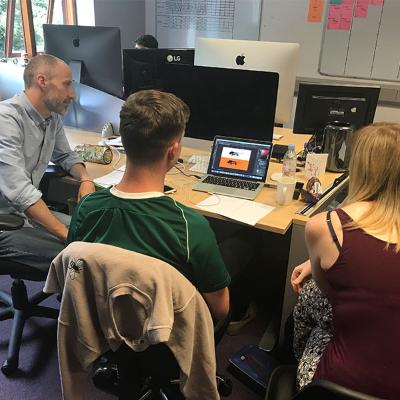
Dyspraxia
What is Dyspraxia?
Dyspraxia, also known as Developmental Coordination Disorder (DCD), is a specific learning difference that may occur independently or alongside others such as dyslexia. It can influence motor learning, coordination, memory, and organisation, but individuals with dyspraxia often demonstrate creativity, determination, and problem-solving abilities, especially when they develop personalised strategies and access helpful tools. People with dyspraxia span all levels of intelligence and ability, and they frequently show remarkable resilience and adaptability in both academic and everyday tasks.
-
You may benefit from guidance and tools that support time management and meeting deadlines, helping you feel more in control of your academic routine.
-
Navigating campus and arriving on time can be easier with consistent routines and visual or digital aids—and once these supports are in place, they often enhance independence and confidence.
-
You might experience challenges with spatial awareness and coordination, which can vary depending on your course—hands-on tasks like using a sewing machine or pipette may require practice, but with adaptive strategies, success becomes more achievable.
-
You may be developing your comfort with physical activities, and finding ways to participate in sports or movement-based tasks that feel supportive and enjoyable can build self-assurance.
-
Note-taking and copying from boards may be an area to strengthen—assistive technologies, adapted formats, or lecture recordings can help streamline this process and support learning.
-
You’re cultivating skills in organising and expressing ideas, and with some structure or planning tools, your thinking can come through more clearly and confidently.
-
Starting a new assignment can feel daunting at first—but with step-by-step approaches and guidance, you can gain momentum and tackle tasks effectively.
-
You’re likely to thrive in creative subjects, showing flair, originality, and imagination—these strengths are valuable across many academic disciplines.
External Dyspraxia Support Links
Dyspraxia (also known as Developmental Coordination Disorder) can affect motor coordination, organisation, memory, and time management—so the right support can make a huge difference in academic success and wellbeing.
Dyspraxia UK – College & University Support
-
Offers practical advice for students transitioning to university life.
-
Covers self-help skills, organisation strategies, and how to access assessments.
-
Recommends tools like vibrating alarm clocks, whiteboards, and Read&Write software.
Dyspraxia Collective – University Guide PDF
-
A downloadable guide written by students with dyspraxia.
-
Explains how to apply for Disabled Students’ Allowance (DSA) and what support it can provide.
-
Includes tips on study skills, time management, and accessing reasonable adjustments like recording lectures or extended deadlines.
BERA – Supporting Dyspraxic Students in Higher Education
-
A research-based article highlighting the need for personalised support.
-
Discusses common challenges and critiques generic accommodations.


/prod01/wlvacuk/media/departments/digital-content-and-communications/images-2024/Architecture-students-tree-planting.png)
/prod01/wlvacuk/media/departments/digital-content-and-communications/images-2024/250630-SciFest-1-group-photo-resized-800x450.png)
/prod01/wlvacuk/media/departments/digital-content-and-communications/submitted-news-images/Way-youth-zone-August.JPG)
/prod01/wlvacuk/media/departments/digital-content-and-communications/images-2024/Arthi-Arunasalam-teaser.jpg)
/prod01/wlvacuk/media/departments/digital-content-and-communications/submitted-news-images/Muslim-woman-playing-football.jpg)
/prod01/wlvacuk/media/departments/digital-content-and-communications/submitted-news-images/Business-School-800x450.jpg)
/prod01/wlvacuk/media/departments/digital-content-and-communications/submitted-news-images/University-of-the-Year.jpg)

